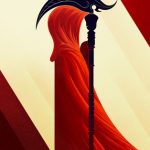 Shadow and Bone by Leigh Bardugo
Shadow and Bone by Leigh Bardugo
My rating: 3 of 5 stars
Publisher: Henry Holt and Co
Length: 358 pgs
Series: The Grisha #1
Format: Hardcover, checked out from local library
Goodreads Synopsis
The Shadow Fold, a swathe of impenetrable darkness, crawling with monsters that feast on human flesh, is slowly destroying the once-great nation of Ravka.
Alina, a pale, lonely orphan, discovers a unique power that thrusts her into the lavish world of the kingdom’s magical elite—the Grisha. Could she be the key to unravelling the dark fabric of the Shadow Fold and setting Ravka free?
The Darkling, a creature of seductive charm and terrifying power, leader of the Grisha. If Alina is to fulfill her destiny, she must discover how to unlock her gift and face up to her dangerous attraction to him.
But what of Mal, Alina’s childhood best friend? As Alina contemplates her dazzling new future, why can’t she ever quite forget him?
Glorious. Epic. Irresistible. Romance.
My Review
I had a lot of expectations for this book. I had seen it heavily advertised in bookstores, glimpsed rave reviews online, and it was always starting at me from an end cap of an aisle. I was nearly attacked by a diner at Chipotle this week because she was so excited to see me reading the series. I finally happened across it at my local library last week and decided to give it a chance, which was hardly difficult to do based on its gorgeous cover.
Ah, and there’s the catch. There’s a reason for the phrase “Never judge a book by it’s cover.”
Not to say it was all bad. The concept is truly fascinating- a “secondary” army of soldiers who can manipulate the elements, materials, and even the human body, who are feared and repressed and kept as pets by their foolish king, who crave a higher status for their abilities. This army, the Grisha, had a fascinating premise- from their unique class structure to the idea that one becomes ill and frail from repressing their power, and stronger and more beautiful by using it- I was enchanted by their foundations, but their execution left me disappointed. What could have been a fantasy world steeped in critical political upheaval, class repression, and issues of identity turned into a thinly veiled boarding-school type drama with mediocre plot revelations and lackluster twists.
Yet I was intrigued by Bardugo’s use of color. The Grisha are color coded by rank and ability, and outliers are marked by their uniquely colored keftas. Servants (and servant Grisha’s, such as Genya) wear white, while black is the color of power and status. Alina, the main character, makes several political choices based upon the colors she wears, and its interesting that the cover of the books use minimal colors while the characters of the books are so dependent upon them.
Alina. Oh dear. There’s really not much to say. She doesn’t stand apart from the typical first-person-YA-underpriveledged-average-looking-slightly-whiny-easily-influenced-female protagonist. I find her circumstances and her powers interesting, but if it weren’t for other peripheral characters who interact with her I don’t know if I would have cared about the story. I loved Genya, and her situation is darkly hinted at throughout the book, and could serve as an interesting commentary on the gender mistreatment of female courtiers and servants. The Darkling proved to be my absolute favorite, though I was disappointed in his character arc, and feel as though he went from a complex character to an oversimplified one in a matter of a few chapters for the sake of a plot device. I sincerely hope that in the rest of the series his character’s background and motives are fleshed out, and not sacrificed for the sake of antagonism.
As I mentioned before, the world of Ravka (which is supposedly loosely based on Russian culture despite the supposed lack of research many other reviews cite) has a lot of potential to be a rich and multi-layered fantasy world with a fascinating mythology, but Bardugo merely scratches the surface on explanations, and leaves readers with more questions about the world than answers: What role does religion play among the Grisha? Is magic (or the “small science,” as what Grisha can do is manipulate matter) a separate entity than religion, yet there is a Grisha saint? How are some Grisha human amplifiers? Why does the Darkling play a special role when there are/have been other Etherealki who can manipulate darkness? Do Genya’s powers always fade, or can they be permanent. Can anything be made into an amplifier as long as a Grisha kills it? Why is Ravka at war with the Shu Han and the Fjerden’s? Do Grisha exist outside of Ravka?
Though there were flaws throughout the novel, I found it to be an easy and engaging read, and have already picked up the second. If you can overlook a rather shallow main character, plot revelations that don’t always make sense, and more telling than showing in the writing style, Shadow and Bone can be appreciated for what it is- another fun, fantasy world amongst YA literature that doesn’t necessarily stand out.






[…] here to read my review of Shadow and […]
[…] changes your opinion of an author? For me, Six of Crows was that book. Sure, I enjoyed the Grisha Trilogy well enough. It had some elements I liked, but it didn’t set itself apart, didn’t […]